5 Reasons to Eat Organic
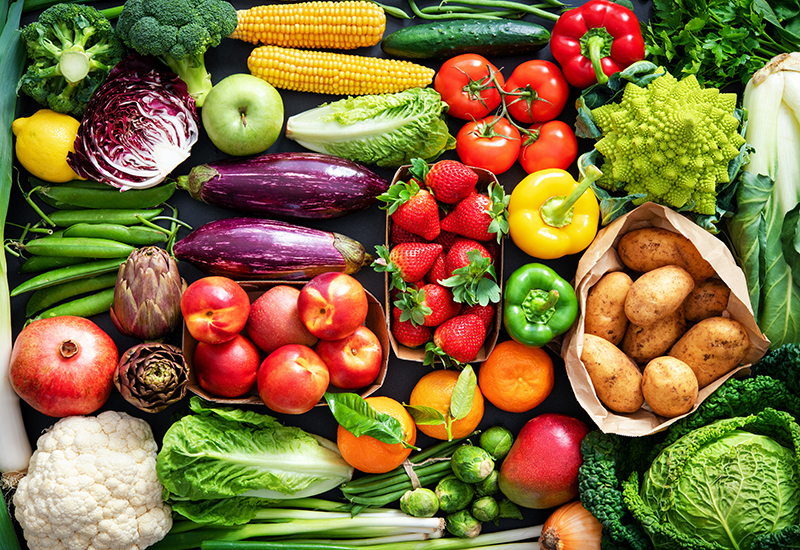
The following information was provided courtesy of local cookbook author and chef, Carla Snyder. Learn more about Carla at Ravenouskitchen.com.
Once the feature of health food co-ops, a wide range of organic food is now regularly found in most supermarkets. For many, the word “organic” has become associated with “better,” but considering the cost, does an organic focus make sense for you and your family? As important, is an organic diet a smarter choice for the environment, our taste buds and our health?
What is Organic?
The term “organic” relates to the way agricultural products are grown and processed. The regulations vary from country to country but in the U.S., to be considered organic, crops must be grown without synthetic herbicides, pesticides, fertilizers or bioengineered genes or GMOs. When it comes to meat, dairy and eggs, the cows and chickens are raised on non-GMO feed, allowed to roam outdoors and are not regularly given hormones or antibiotics.
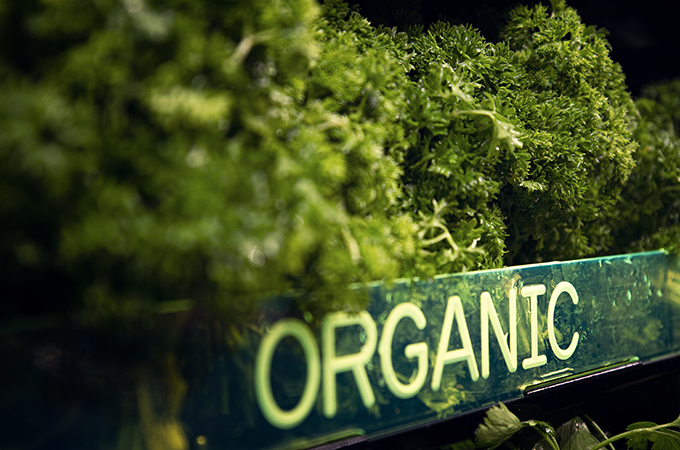
Why is Organic Food Often Expensive?
Growing organic food is more labor intensive since the farmers do not use synthetic pesticides, chemical fertilizers or drugs. Also, organic certification is expensive and organic feed for animals can cost twice as much as conventional feed. Finally, organic farms tend to be smaller than conventional farms, which means fixed costs must be distributed across smaller produce volumes without government subsidies.
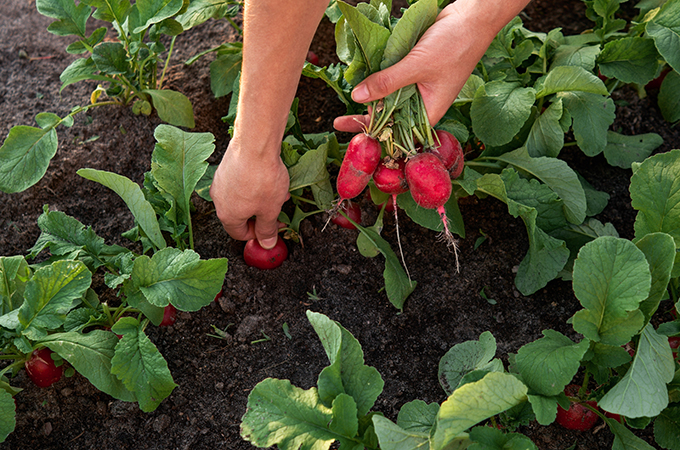
Organic vs. Conventional?
How does one choose between, say, a conventionally grown apple and an organic apple when they both look delicious and healthful? The price difference between organic and conventional produce is easy to see, but the quality difference is more complicated. The motivation for many organic buyers is the perceived health and environmental benefits.
5 Reason to Eat Organic
- Less Pesticides. Most of us have an accumulated build-up of pesticides in our bodies due to numerous years of exposure. This chemical “body burden” as it is medically known could lead to health issues such as headaches, birth defects and added strain on weakened immune systems. So, eating an organic diet could be even more healthful for persons with weakened immune systems or chronic illness. Young children are also more susceptible to the effects of pesticide exposure due to their small size and developing neural systems. However, despite popular belief, organic farms do use pesticides. The difference is that organic farmers only use naturally-derived pesticides rather than the synthetic pesticides used on conventional commercial farms. That said, your exposure to harmful pesticides will likely be lower when eating organic.
*If you suffer from chronic illness or a weakened immune system, please consult a healthcare professional before making any changes to your daily diet. - Organic farming tends to be better for the environment. Organic farming practices may reduce pollution, conserve water, reduce soil erosion, increase soil fertility and use less energy. Farming without synthetic pesticides is also better for nearby birds and animals as well as people who live close to farms.
- Studies have shown small-to-moderate increases in some nutrients in organic produce. The best evidence of a significant nutritional increase is in certain flavonoids, which have antioxidant properties. Reviews of multiple studies show that organic varieties provide greater levels of vitamin C, iron, magnesium and phosphorus than non-organic varieties of the same foods. While being higher in these nutrients, they are also significantly lower in nitrates and pesticide residues. In addition, organic foods typically provide greater levels of a number of important antioxidant phytochemicals such as anthocyanins, flavonoids and carotenoids.
- There are no antibiotics or synthetic hormones in organic meat, dairy and eggs. Drug residue from conventionally raised meat, dairy and eggs is believed to contribute to widespread antibiotic resistance. Organic foods, which are produced without antibiotics, are safer in this respect. Organic meat and dairy also cannot contain synthetic hormones, which have been linked to an increased risk of cancer.
- Organic livestock have better lives. Conventional livestock can be fed antibiotics to protect against illness, making it easier for farmers to raise animals in crowded, unsanitary conditions. The FDA limited the use of certain antibiotics for livestock earlier this year, but loopholes in the legislation still exist. With the exception of poultry, conventionally raised animals can also be injected with synthetic growth hormones, so they’ll gain weight faster or produce more milk.
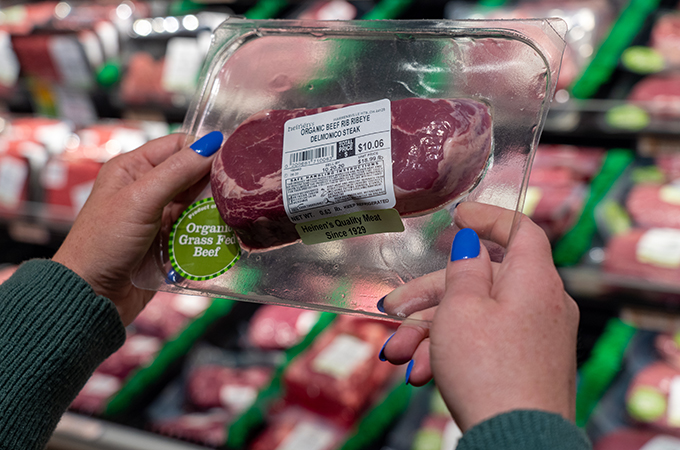
Know Your Produce Pesticide Levels
Certain types of conventionally grown produce contain more pesticides than others and should be avoided when possible. Others are low enough that buying non-organic is relatively safe.
According to the Environmental Working Group, a nonprofit organization that analyzes the results of government pesticide testing in the U.S., the following fruits and vegetables have the highest pesticide levels, so it’s best to buy organic:
- Apples
- Sweet Bell Peppers
- Cucumbers
- Celery
- Potatoes
- Grapes
- Cherry Tomatoes
- Kale/Collard Greens
- Summer Squash
- Nectarines (imported)
- Peaches
- Spinach
- Strawberries
- Hot Pepper
On the other hand, the “Clean 15” are conventionally grown fruits and vegetables are generally have a lower pesticide load. These items include:
- Asparagus
- Avocado
- Mushrooms
- Cabbage
- Sweet Corn
- Eggplant
- Kiwi
- Mango
- Onion
- Papaya
- Pineapple
- Sweet Peas (frozen)
- Sweet Potatoes
- Grapefruit
- Cantaloupe
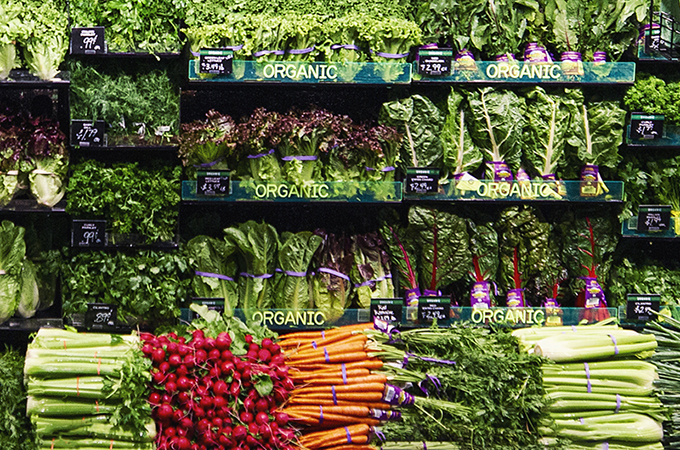
Food Safety Tips
Whether you go totally organic or opt to mix conventional and organic foods, be sure to keep these tips in mind:
- Wash and scrub fresh fruits and vegetables thoroughly under running water. Washing helps remove dirt, bacteria and traces of chemicals from the surface of fruits and vegetables, but not all pesticide residue can be removed by washing. Discarding outer leaves of leafy vegetables can reduce contaminants. Peeling fruits and vegetables can remove contaminants but may also reduce nutrients.
- Select a variety of foods from a variety of sources. This will give you a better mix of nutrients and reduce your likelihood of exposure to a single pesticide.
- Buy fruits and vegetables in season when possible. To get the freshest produce, ask your local Heinen’s produce associate what is in season and plan meals accordingly.
- Read food labels carefully. Just because a product says it’s organic or contains organic ingredients doesn’t necessarily mean it’s a healthier alternative. Some organic products may still be high in sugar, salt, fat or calories.
- Natural and organic do not mean the same thing. In general, “natural” on a food label means that it has no artificial colors, flavors or preservatives. It does not refer to the methods or materials used to produce the food ingredients.
With these tips and guidelines, it will be easier for you to figure out whether buying organic makes sense for your family. No matter what, eating lots of fruit and vegetables is a good idea. Most nutritionists argue that it is more important for people to increase their consumption of fruits and vegetables—regardless of how they are grown.
We do a mix of organic and conventional foods in our house, buying only organic grapes, lettuce and berries but conventional oranges, bananas and potatoes. In the summer, I especially like to buy locally grown organic produce because I think it tastes best. Until then, explore the bountiful produce section at your local Heinen’s and choose the most healthful, affordable and delicious combination for you.


